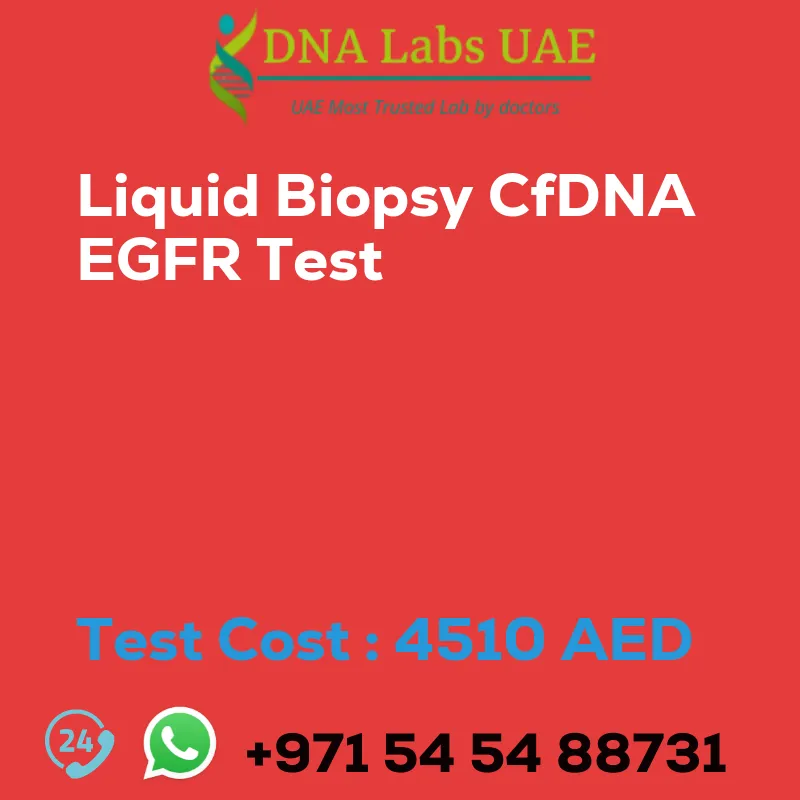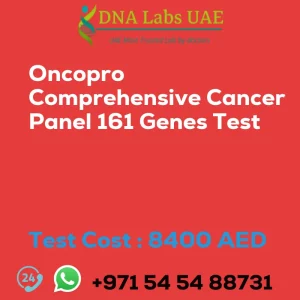LIQUID BIOPSY CfDNA EGFR Test
Test Name: LIQUID BIOPSY CfDNA EGFR Test
Components: For Colorectal & Lung Cancer: *p.E746_A750 deletion, *p.T790M mutation, *p.L858R mutation
Price: 4510.0 AED
Sample Condition: 10 mL whole blood in 1 Streck tube. Ship refrigerated. DO NOT FREEZE. Clinical history is mandatory.
Report Delivery: Sample Mon / Thu by 9 am; Report Fri / Tue
Method: Droplet Digital PCR
Test Type: Cancer
Doctor: Oncologist
Test Department: MOLECULAR DIAGNOSTICS
Pre Test Information: Clinical history is mandatory.
Test Details:
Liquid biopsy cfDNA EGFR testing is a type of genetic testing that is used to identify specific mutations in the epidermal growth factor receptor (EGFR) gene in circulating cell-free DNA (cfDNA) samples. This type of testing is commonly used in the field of oncology to guide treatment decisions for patients with non-small cell lung cancer (NSCLC) who have EGFR mutations.
Liquid biopsy refers to the analysis of genetic material, such as DNA, that is found in bodily fluids like blood. In the case of cfDNA EGFR testing, a blood sample is taken from the patient and the cfDNA is isolated and analyzed for specific mutations in the EGFR gene.
EGFR mutations are important in NSCLC because they can affect how cancer cells grow and respond to certain treatments. The cfDNA EGFR test can detect various EGFR mutations, including the most common ones such as exon 19 deletions and exon 21 L858R substitutions. Identifying these mutations is crucial for determining the most appropriate treatment options for patients with NSCLC. For example, patients with certain EGFR mutations may benefit from targeted therapies, such as EGFR tyrosine kinase inhibitors (TKIs), which specifically target cancer cells with these mutations.
Compared to traditional tissue biopsies, liquid biopsy cfDNA EGFR testing offers several advantages. It is a non-invasive procedure that can be easily repeated over time to monitor treatment response and detect any emerging resistance mutations. Liquid biopsy also allows for a more comprehensive analysis of tumor heterogeneity, as it can capture genetic changes from different tumor sites that may not be accessible through tissue biopsies.
In summary, liquid biopsy cfDNA EGFR testing is a valuable tool in the field of oncology for identifying EGFR mutations in patients with NSCLC. It helps guide treatment decisions and monitor treatment response, offering a less invasive and more comprehensive approach compared to traditional tissue biopsies.
| Test Name | LIQUID BIOPSY CfDNA EGFR Test |
|---|---|
| Components | For Colorectal & Lung Cancer:*p.E746_A750 deletion*p.T790M mutation *p.L858R mutation |
| Price | 4510.0 AED |
| Sample Condition | 10 mL whole blood in 1 Streck tube. Ship refrigerated. DO NOT FREEZE. Clinical history is mandatory. |
| Report Delivery | Sample Mon / Thu by 9 am; Report Fri / Tue |
| Method | Droplet Digital PCR |
| Test type | Cancer |
| Doctor | Oncologist |
| Test Department: | MOLECULAR DIAGNOSTICS |
| Pre Test Information | Clinical history is mandatory. |
| Test Details |
Liquid biopsy cfDNA EGFR testing is a type of genetic testing that is used to identify specific mutations in the epidermal growth factor receptor (EGFR) gene in circulating cell-free DNA (cfDNA) samples. This type of testing is commonly used in the field of oncology to guide treatment decisions for patients with non-small cell lung cancer (NSCLC) who have EGFR mutations. Liquid biopsy refers to the analysis of genetic material, such as DNA, that is found in bodily fluids like blood. In the case of cfDNA EGFR testing, a blood sample is taken from the patient and the cfDNA is isolated and analyzed for specific mutations in the EGFR gene. EGFR mutations are important in NSCLC because they can affect how cancer cells grow and respond to certain treatments. The cfDNA EGFR test can detect various EGFR mutations, including the most common ones such as exon 19 deletions and exon 21 L858R substitutions. Identifying these mutations is crucial for determining the most appropriate treatment options for patients with NSCLC. For example, patients with certain EGFR mutations may benefit from targeted therapies, such as EGFR tyrosine kinase inhibitors (TKIs), which specifically target cancer cells with these mutations. Compared to traditional tissue biopsies, liquid biopsy cfDNA EGFR testing offers several advantages. It is a non-invasive procedure that can be easily repeated over time to monitor treatment response and detect any emerging resistance mutations. Liquid biopsy also allows for a more comprehensive analysis of tumor heterogeneity, as it can capture genetic changes from different tumor sites that may not be accessible through tissue biopsies. In summary, liquid biopsy cfDNA EGFR testing is a valuable tool in the field of oncology for identifying EGFR mutations in patients with NSCLC. It helps guide treatment decisions and monitor treatment response, offering a less invasive and more comprehensive approach compared to traditional tissue biopsies. |








